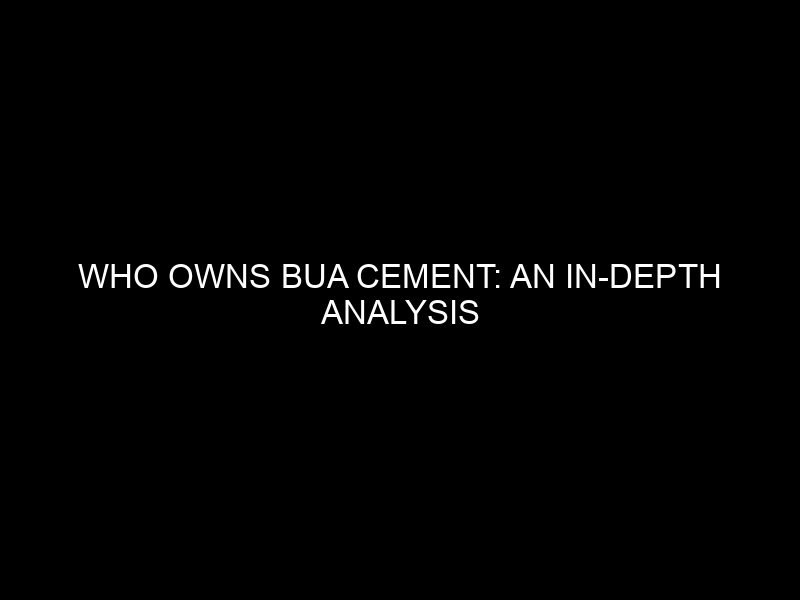In the dynamic world of business and industrial development, BUA Cement has emerged as a significant player, especially in the Nigerian market. As a professional with a background in Nigerian business and specific insights into the workings of the BUA Group, this article aims to shed light on the ownership of BUA Cement, delving into the intricacies that make it a unique entity in the industry. Understanding the ownership structure of BUA Cement is not just about knowing the key stakeholders but also about comprehending the strategic vision that drives its success.
The Ownership Structure of BUA Cement
The Man Behind the Success: Abdul Samad Rabiu
At the heart of BUA Cement’s ownership is the influential figure of Abdul Samad Rabiu, a prominent Nigerian businessman and industrialist. As the founder and chairman of BUA Group, Rabiu has been instrumental in steering the company towards substantial growth and market dominance. Born in Kano, Nigeria, in 1960, he inherited the business acumen from his father, Khalifah Isyaku Rabiu, a well-known industrialist in the 1970s and 1980s.
Under Abdul Samad Rabiu’s leadership, BUA Group diversified its interests, encompassing various sectors, including cement production, sugar refining, and real estate. BUA Cement, a subsidiary of BUA Group, reflects Rabiu’s vision of creating a self-reliant Nigeria in terms of building and construction materials. His strategic focus on investing in state-of-the-art technology and sustainable practices has positioned BUA Cement as a front-runner in the industry.
BUA Group: The Conglomerate Behind the Brand
While Abdul Samad Rabiu is a key figure in the ownership, BUA Cement is a part of the larger conglomerate, BUA Group. This diversified group has interests in various sectors, but its cement division has witnessed exponential growth. BUA Group’s philosophy revolves around providing high-quality products and services while contributing to Nigeria’s economic growth. The ownership of BUA Cement by BUA Group symbolizes a commitment to excellence and innovation in the cement industry.
Stock Market and Public Ownership
Apart from the direct ownership by Abdul Samad Rabiu and BUA Group, BUA Cement also has a significant public aspect to its ownership. As a company listed on the Nigerian Stock Exchange, a portion of BUA Cement is owned by public shareholders. This public ownership adds an extra layer of accountability and transparency to the company’s operations, aligning it with international best practices in corporate governance.
The Strategic Vision Driving BUA Cement
Commitment to Quality and Sustainability
BUA Cement is not just about producing cement; it’s about creating a sustainable future. The company’s commitment to environmental sustainability is evident in its use of cutting-edge technology to minimize carbon emissions and its initiatives in sourcing alternative energy. This focus on sustainability is not just a corporate responsibility but also a strategic vision that aligns with global environmental goals.
Economic Impact and Community Development
BUA Cement plays a crucial role in Nigeria’s economy, not only as a major employer but also as a catalyst for community development. The company’s investment in local communities, through various social responsibility projects, underscores its commitment to inclusive growth. From building infrastructure to empowering local talent, BUA Cement’s ownership understands the importance of giving back to the community.
FAQs About BUA Cement’s Ownership
Q: How much of BUA Cement does Abdul Samad Rabiu own? A: Abdul Samad Rabiu, through BUA Group, holds a significant majority stake in BUA Cement. However, the exact percentage varies with market dynamics and additional investments.
Q: Is BUA Cement a fully Nigerian-owned company? A: Yes, BUA Cement is predominantly Nigerian-owned, with its major ownership lying with Nigerian businessman Abdul Samad Rabiu and BUA Group.
Q: Can the public invest in BUA Cement? A: Yes, as BUA Cement is listed on the Nigerian Stock Exchange, it is open for public investment.
Q: How does BUA Cement’s ownership impact its business strategy? A: The ownership structure, particularly the influence of Abdul Samad Rabiu, has shaped BUA Cement’s focus on quality, innovation, and sustainable practices.
Q: Has BUA Cement contributed to Nigeria’s economy? A: Absolutely. BUA Cement has significantly contributed to Nigeria’s economy through job creation, infrastructure development, and by being a major player in the building materials sector.
Conclusion
The ownership of BUA Cement, primarily by Abdul Samad Rabiu and BUA Group, reflects a combination of visionary leadership, strategic business practices, and a deep commitment to Nigeria’s development. As the company continues to thrive in the competitive market, its ownership remains a testament to the potential of Nigerian enterprises in the global arena. The story of BUA Cement is not just about ownership but about a vision that transcends business, aiming for a sustainable and prosperous future for all.

Leave a Reply